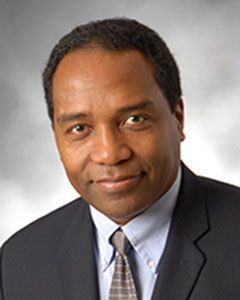
Griffin P. Rodgers, MD, FEL ‘89, director of the National Institute of Diabetes and Digestive and Kidney Diseases (NIDDK), will serve as the keynote speaker at the 2018 MD Diploma Ceremony, held on Sunday, May 20, at 2:30 p.m. at Lisner Auditorium.
Over the last decade, Rodgers has led the NIDDK, part of the National Institutes of Health (NIH), in its commitment to vigorous, multi-pronged research efforts on diabetes and other endocrine and metabolic diseases.
He is known for his contributions to the development of the first effective therapy for sickle cell anemia. He was a principal investigator in clinical trials to develop therapy for patients with sickle cell disease and also performed basic research that focused on understanding the molecular basis of how certain drugs induce gamma-globin gene expression. Recently, he and his collaborators reported on a modified blood stem-cell transplant regimen that is highly effective in reversing sickle cell disease in adults and is associated with relatively low toxicity.
Rodgers has published over 200 original research articles, reviews, and book chapters, edited four books and monographs, and holds three patents. He has been honored for his research with numerous awards, including the 1998 Richard and Hinda Rosenthal Foundation Award, the 2000 Arthur S. Flemming Award, the Legacy of Leadership Award in 2002, and a Mastership from the American College of Physicians in 2005. He is a member of the American Society of Hematology, the American Society of Clinical Investigation, the Association of American Physicians, the American Academy of Arts and Sciences, and the National Academy of Medicine, among others. He served as Governor to the American College of Physicians and as Chair of the Hematology Subspecialty Board and a member of the American Board of Internal Medicine Board of Directors.
Rodgers received his undergraduate, graduate, and medical degrees from Brown University in Providence, Rhode Island. He performed his residency and chief residency in internal medicine at Barnes Hospital and the Washington University School of Medicine in St. Louis. His fellowship training in hematology was part of a joint program by the NIH with the George Washington University and the Washington DC VA Medical Center. In addition to his medical and research training, he earned an MBA, with a focus on the business of medicine/science, from Johns Hopkins University in 2005.
For more information about GW School of Medicine and Health Sciences graduation celebrations, please visit GW Today.
For more information about GW Commencement, please visit the commencement website.


